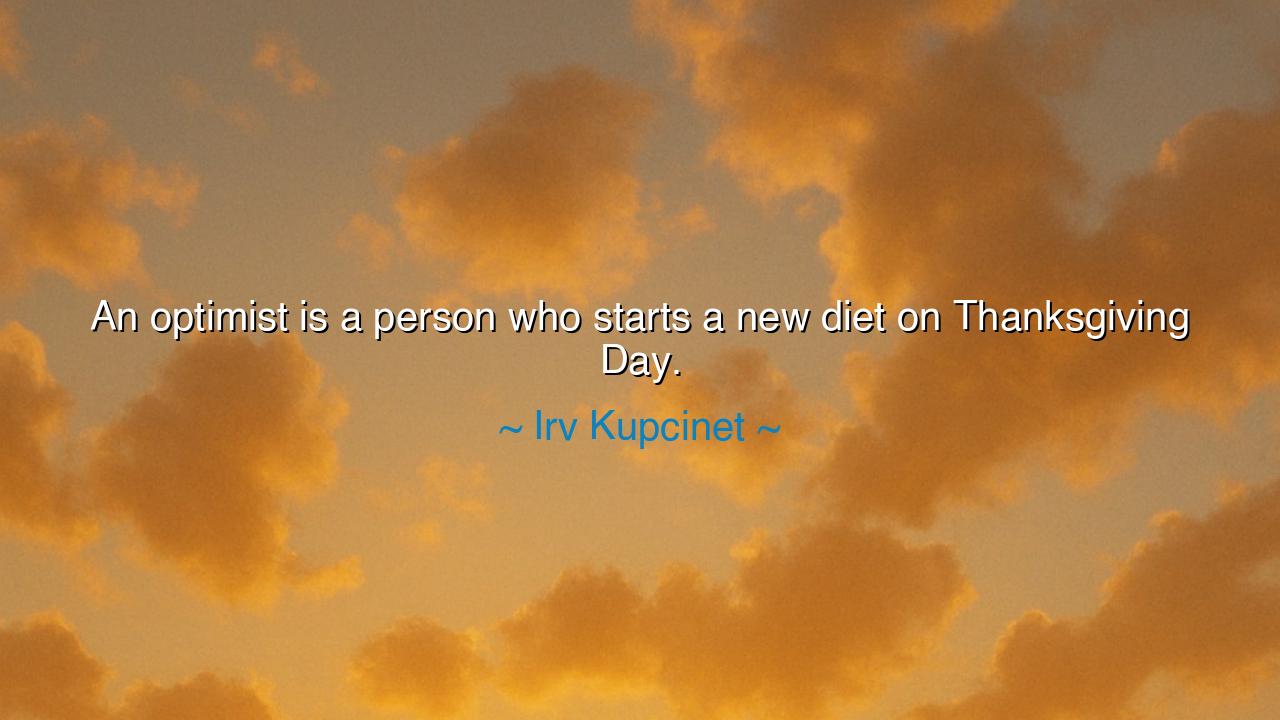
An optimist is a person who starts a new diet on Thanksgiving






In the words of Irv Kupcinet, “An optimist is a person who starts a new diet on Thanksgiving Day,” we hear the laughter of wisdom—lighthearted, yet profound. It is a jest, yes, but beneath it lies the pulse of a deeper truth: that hope is the fire that burns even in the most improbable of moments. Kupcinet, a writer and observer of human folly, captured with wit what the ancients might have called courage in absurdity—the strength to begin when all signs tell us not to. For what is optimism, if not the defiance of circumstance, the belief that even amidst the feast, one may choose restraint and renewal?
To begin a diet on Thanksgiving Day, the most indulgent of feasts, is an act bordering on the heroic—or the foolish. Yet in that foolishness is the spark of the divine. The optimist, in Kupcinet’s eyes, is not merely one who hopes for better days, but one who dares to act as though those days have already begun. He is the soul who looks upon a table heavy with abundance and says, “Here begins my discipline.” Such a spirit is rare and radiant, for it is easy to start anew when the path is clear, but it is sacred to start when the world tempts you otherwise. The ancients would have seen in such a person the mark of the Stoic, who keeps his resolve not because life is easy, but because it is right.
In the days of Rome, Cato the Younger stood as such an optimist. Amid the corruption of empire and the decay of virtue, he wore the plain robe, ate the simplest meals, and held to his integrity when others feasted on luxury and deceit. The men of his age called him stubborn; the ages that followed called him wise. For like Kupcinet’s optimist, he began his diet on Thanksgiving’s table—he chose discipline when indulgence was all around him. His example teaches that true optimism is not the denial of difficulty, but the belief that goodness is still worth striving for, even when the world laughs at such effort.
Kupcinet’s humor also speaks to the human spirit’s yearning for renewal. Thanksgiving, the day of gratitude and abundance, symbolizes life’s fullness—the joy of what we have been given. To begin a diet on such a day is to say: “I am grateful, yet I still seek to grow.” It is to acknowledge that gratitude and aspiration are not enemies, but companions. The ancients understood this balance well. The Epicureans, though famed for pleasure, taught moderation: that one may delight in the feast without being enslaved by it. The optimist embodies this truth—he finds joy not in denial, but in direction.
Yet Kupcinet’s words carry also a gentle warning. Many proclaim resolutions while the feast still glows, yet few keep them when the table is cleared. The lesson, then, is not to begin grandly, but to persist quietly. The optimist who begins on Thanksgiving must also wake the next morning and continue. The ancients taught that the truest strength lies not in the first act, but in the steady heart that follows through. The discipline of constancy is the root from which hope draws its nourishment. For optimism without endurance is a spark that dies in the wind; but optimism bound to will becomes a flame that endures the night.
In this, we see that Kupcinet’s jest conceals a call to action. To begin one’s “diet” on Thanksgiving is to begin now—not when it is convenient, not when the world applauds, but when the challenge is greatest. It is to seize the present moment as the only moment that matters. The great philosopher Seneca once wrote, “While we wait for life, life passes.” So, too, while we wait for the perfect day to begin, the opportunity is lost. The optimist, wise or foolish as he may seem, begins now. He knows that to act imperfectly today is nobler than to dream of perfection tomorrow.
Let this be the teaching passed down: Do not wait for the world to make your beginning easy. The right time is the moment your heart awakens to change. Begin your labors not when the table is empty, but when it overflows. Start your discipline not when temptation is gone, but when it stands before you. For every act of courage, no matter how small, plants the seed of transformation.
Thus, remember the wit and wisdom of Irv Kupcinet: the true optimist is not one who denies difficulty, but one who begins anyway. To start a new journey in the midst of plenty, to choose restraint amid abundance, to take the first step while others rest—this is the spirit that reshapes the world. Be that optimist. Begin today, even if it is Thanksgiving. For hope, when acted upon, is the feast that never ends.






AAdministratorAdministrator
Welcome, honored guests. Please leave a comment, we will respond soon